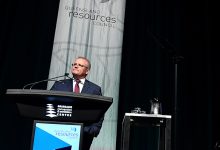Prime Minister Scott Morrison’s pledge to crack down hard on climate change protests has been slammed as “undemocratic” and labelled a move that may have unintended consequences for the Government and the coal industry.
In a show of solidarity with the coal industry, Morrison outlined his plan to crack down on climate protestors and campaigns that encourage ‘secondary boycotts’ on companies providing services to the fossil fuel industry, in a speech to the Queensland Resources Council’s ‘State of the Sector’ forum in Brisbane.
“[There is an] even more worrying development. An escalating trend towards a new form of secondary boycotts, Morrison said.
“This is a trend with potentially serious consequences for our economy. Environmental groups are targeting businesses and firms who provide goods or services to firms they don’t like, especially in the resources sector.
“They are targeting businesses of all sizes, including small businesses, like contracting businesses in regional Queensland. It is a potentially more insidious threat to the Queensland economy and jobs and living standards than a street protest.”
“It is a potentially more insidious threat to the Queensland economy and jobs and living standards than a street protest,” the prime minister added.
Successful campaigns have targeted companies that may be providing services to new fossil fuel projects, pressuring them to disassociate from fossil fuel projects.
The Adani Carmichael coal mine serves as the most prominent example, with Stop Adani campaigners targeting firms like engineering companies GHD, Aurecon and Downer Group and each of the Big Four banks, calling for the companies to refuse to deal with the Adani project.
The move to outlaw certain climate change protests was slammed by the Human Rights Law Centre, labelling the move as part of an “undemocratic trend” from governments to stamp out protest, adding that protest laws should be strengthened and secondary boycotts had played a pivotal role in human rights campaigns.
“From ending slavery to stopping apartheid, boycott campaigns have played a critical role in achieving many social advances that we now take for granted,” executive director of the Human Rights Law Centre Hugh de Kretser said. “The Morrison Government’s announcement that it is looking to ban certain boycott campaigns is deeply concerning.”
“Protest is an essential part of our democracy. To protect our democracy and help ensure a better future for all Australians, governments should be strengthening our rights to come together and protest, not weakening them.”
But Morrison claimed that the protests were a threat to the Queensland economy, and will seek to outlaw the campaign strategy of ‘secondary boycotts’.
“Let me assure you this is not something my Government intends to allow to go unchecked,” Morrison said in his speech
“Together with the Attorney-General, we are working to identify mechanisms that can successfully outlaw these indulgent and selfish practices that threaten the livelihoods of fellow Australians, especially in rural and regional areas, and especially here in Queensland.”
The Queensland Resources Council is headed by former federal resources and industry minister Ian Macfarlane.
The crackdown on fossil fuel boycotts is a bizarre demand that may have perverse, unexpected, outcomes for the Prime Minister.
Many forms of ‘secondary boycotts’ have been rendered unlawful under the Competition and Consumer Act, as they have been a historical tactic of unions against antagonistic companies.
However, the Competition and Consumer Act includes an explicit exemption that allows for secondary boycotts for campaigns related to ‘environmental protection’.
The flight from businesses with high exposure to the fossil fuel industry hasn’t just been driven by protestors concerned for the environment, but also from large portions of the Australian business and finance sectors that see climate change as an emerging physical and financial risk.
These risks aren’t solely related to fossil fuel producers, but also to those companies that are reliant on the fossil fuel sector for business. Investors see the need to act on climate change as a risk to these companies and are beginning to respond by likewise pressuring these companies to adapt.
This has often been lead superannuation funds and wealth managers, such as the Climate Action 100+ initiative, who Morrison risks alienating with a strong crackdown on boycott campaigns.
The abandonment of the fossil fuel industry has followed advice from Australian financial regulators; ASIC, APRA and the Reserve Bank, who have all said that it is prudent for the Australian economy to reduce its exposure to climate change related risks.
Instead, Morrison urged companies to embrace their ‘quiet shareholders’, who presumably are not those who challenge companies and their boards to do more on climate change.
“I think some of our largest corporations should listen to, and engage, their ‘quiet shareholders’, not just their noisy ones,” Morrison said.
This was a point made by the Australian Conservation Foundation, which highlighted the fact that it is not just environmental groups leading the charge away from the fossil fuel sector, but also the major banks and institutional investors.
“The wider business world is moving away from coal because they can see it is damaging our climate and damaging the economy,” ACF’s CEO Kelly O’Shanassy said.
“Big institutional investors are turning their backs on coal because they can see the damage climate change is doing to their portfolios and because the financial returns are better from clean technology.”
“To paint this broad community concern as being about ‘fringe-dwelling extremists’ is an insult to all Australians who want to better future for themselves and their children.”
Campaigning group GetUp! was also quick to slam the proposal from Morrison, saying it was an attempt to those criticising the government for its lack of action on climate change.
“The government doesn’t have a plan for the climate crisis, so it’s cracking down on activists who want nothing more than the government to take the issue seriously,” GetUp’s head of campaigns Emily Mulligan said
“It’s ludicrous that the Prime Minister’s priority is to crack down on everyday people speaking up on issues they care about when we do not have a plan to address the real and immediate threat of climate change.
However, Morrison’s proposed anti-boycott laws may win the support of the Labor party, with deputy federal leader Richard Marles telling the Today Show that he thought protestors have been “absolutely indulgent”.
“[I] completely agree with the Prime Minister’s assessment of that… these are people who are not actually about a cause, they’re about engaging in a personal experience at the expense of Australians, in this case Victorians, trying to get on with their lives,” Marles said.
“We’ll have a look at whatever the Government is putting forward.”
The move has however been slammed by the Greens, with Greens Federal MP Adam Bandt accusing the prime minister of “dismantling democracy” in his push to outlaw the climate campaigns.
The moved by the Federal government to introduce anti-protest laws follows laws introduced in Queensland to crackdown on civil disobedience campaigns. Similar legislation is also being considered in New South Wales and South Australia.







